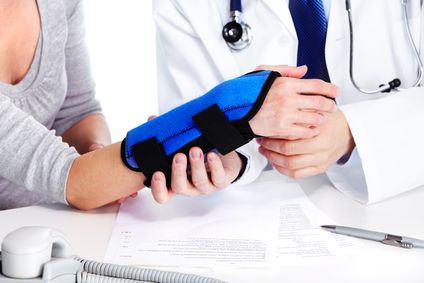Complex Regional Pain Syndrome (CRPS) can be a confusing and frightening medical diagnosis. CRPS can develop from relatively minor injuries. However, when CRPS develops, these relatively minor injuries often become life changing.
Complex Regional Pain Syndrome has been known by many names. Many people still refer to CRPS as “Reflex Sympathetic Dystrophy” or “RSD” for short. It also used to be called “causalgia”.
Before going further, it is important to understand that this article is not intended to provide medical advice. The author of this blog is an attorney, not a doctor. Instead of providing medical advice, this article is simply intended to provide an understanding of what can be expected under the Georgia workers’ compensation laws if you develop complex regional pain syndrome.
Common Symptoms of CRPS
Two of the most common symptoms of CRPS are pain and hypersensitivity. Both of these problems can make it difficult to return to work.
Hypersensitivity can be a significant problem because even a light touch to the affected area can be painful. This pain it can make it very difficult to return to work because you want to avoid use of the affected arm or leg.
Complex Regional Pain Syndrome Spreading
Sometimes, CRPS is confined to just a small area of the body. However, one of the unusual things about CRPS is that it sometimes “spreads”.
For example, an individual might originally develop CRPS from a fractured right hand. It would not be unusual for the CRPS and the pain that it causes to “spread” from your right hand to other areas of your right arm. It might also spread to the other arm or to either leg.
Medical treatments for Comple Regional Pain Syndrome
There are many different types of medical treatment that are used to treat CRPS. If you develop CRPS, you will probably end up treating with a pain management specialist. That pain management specialist will probably treat you with some combination of prescription medications. Other treatment options may include physical therapy, sympathetic nerve blocks, ketamine, and spinal cord stimulation.
The treatment of CRPS is constantly evolving. Doctors are working to understand it better and to develop better treatments for it. It is very important to discuss any treatment options with your doctor before pursuing treatment.
Catastrophic designation in CRPS cases
Since Complex Regional Pain Syndrome can be extremely painful and can affect multiple parts of the body, injured workers who develop CRPS often qualify for a catastrophic designation because of their inability to return to work. This is especially important given the change in Georgia workers’ compensation law that limits medical treatment to 400 weeks if your case is not designated catastrophic. Also, a catastrophic designation usually allows you to continue receiving temporary total disability benefits.
If your CRPS affects one or both legs, you also may have issues with walking and stairs. A catastrophic designation will also allow you to get a catastrophic rehabilitation supplier on your case. This can be important if you are having difficulty with suitable housing and transportation.
What should I do if I develop CRPS from a work injury?
Because CRPS is a very confusing and often frightening diagnosis, it is important to make sure you get good medical treatment. If your CRPS is severe, you will probably have difficulty returning to work.
In this situation, it is important to understand the time limits on workers’ compensation benefits in Georgia and the exceptions to them. If you are uncertain about these, I would recommend setting up a free consultation. If you think that might be of interest to you, take a look at this article to find out more information about what a free consultation is, what you will learn and how long it will take.










